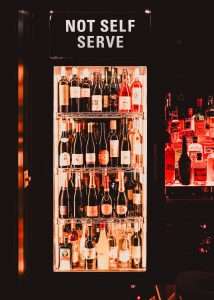Wine Fridge Temperature: How Cold Should It Be? How Does It Affect Wine?

Storing wine, the nectar of the gods, is a careful and deliberate art. Wine enthusiasts know that creating the perfect environment for this prized beverage is crucial to maintaining its delightful flavors and aromas. One of the critical factors to consider when storing wine is the temperature at which it’s kept, especially in a wine fridge. But how cold should the fridge be? What is the ideal temperature to keep wine, and how does temperature affect this exquisite elixir? In this article, we will delve into the world of wine fridge temperature, exploring the reasons behind the need for cold storage and understanding how different temperatures can impact your wine.
Why keep wine in a Cold fridge?
Wine is a complex and delicate beverage that evolves with time. It undergoes a series of chemical reactions within the bottle, and temperature plays a pivotal role in this aging process. Keeping wine in a cold fridge is essential for several reasons:
1. Preserving Flavor and Aroma
Wine is a symphony of flavors and aromas, and temperature can either enhance or diminish these attributes. Storing wine at an optimal temperature helps maintain the balance of flavors and the intensity of aromas, ensuring that every sip is a delightful experience. The delicate dance of fruit, spice, and oak notes is best enjoyed when preserved at the right temperature, making the entire wine-drinking experience more satisfying.
2. Aging Gracefully
Certain wines are intended to be aged, and this aging process is significantly influenced by temperature. Consistently storing wine at the right temperature allows it to evolve gracefully, improving its structure, complexity, and overall quality. The reds become velvety, the whites gain depth, and the symphony of flavors becomes a harmonious masterpiece. When aged under the proper conditions, wines can reach their zenith, offering an experience that is nothing short of extraordinary.
3. Preventing Spoilage
Exposing wine to high temperatures can lead to spoilage. Overly warm storage conditions can cause the wine to age prematurely, resulting in off-putting aromas and flavors. A bottle of wine should unfold its story gradually, like chapters in a novel, and not reveal all its secrets at once. Storing it at the right temperature is akin to giving it a cozy library to rest in, where it matures in peace and attains the complexity it deserves.
4. Avoiding Aroma and Flavor Loss
Storing wine at excessively high temperatures can cause the loss of volatile aroma compounds and flavor molecules, making the wine less enjoyable. Just as a dish that’s cooked too quickly can lose its depth of flavor, wine exposed to excessive heat can fall short of its full potential. The aroma compounds and flavor molecules are what make each wine unique, and keeping them intact through appropriate temperature control ensures that your wine tells its full story on the palate.
5. Temperature Consistency
Wine prefers stability. Fluctuating temperatures can lead to expansion and contraction of the cork, which in turn allows oxygen to seep into the bottle, potentially ruining the wine. Consistency is key to proper storage. Think of it as a tranquil sanctuary for your wine, where it remains undisturbed, allowing the chemistry within to work its magic. This stable environment ensures that every bottle is a masterpiece, ready to be uncorked and savored at its peak.
What Kind of Fridge Should You Use?
When it comes to choosing a suitable fridge for wine storage, wine enthusiasts often opt for specialized wine fridges, also known as wine coolers. These devices are engineered to uphold a consistent temperature tailored for the preservation of wine. They offer a controlled environment that ensures the perfect conditions for your precious bottles.

Most wine coolers have a temperature range of 40 to 67 degrees Fahrenheit (4.4 to 19.4 degrees Celsius). While some units can go below 40 degrees, it’s important to note that extremely low temperatures are not ideal for wines. Before purchasing a wine cooler, it’s essential to ensure that you have a suitable space to maintain the specified ambient temperature range. Most wine coolers should be installed inside insulated rooms away from direct sun exposure for optimal efficiency.
What Happens if Wine is Not Kept Cool?
Storing wine in conditions that are too warm or inconsistent can have detrimental effects on its quality. Here are some consequences of not keeping wine cool:
- Premature Aging: Wine may age too quickly, robbing you of the opportunity to enjoy its optimal flavor and aroma profile. Just as a story loses its depth if you skip to the end, a wine that ages prematurely may not have the chance to fully develop its character. By keeping wine cool, you allow it to mature gracefully, offering a more profound tasting experience.
- Aroma and Flavor Loss: High temperatures can lead to the loss of delicate aromas and flavors, diminishing the wine’s overall quality. Imagine savoring a dish where the key ingredients are missing – it’s just not the same. Wine is no different; the loss of delicate aromas and flavors can leave it incomplete and less enjoyable. Proper storage keeps these elements intact, ensuring your wine delights your senses with every sip.
- Oxidation: Fluctuating temperatures can cause corks to expand and contract, allowing oxygen to seep in. This can lead to oxidation, resulting in off-putting wine characteristics. Oxidation is the nemesis of wine; it can turn vibrant reds into flat, dull wines and whites into lackluster beverages. Storing wine consistently at the right temperature ensures the cork remains snug, keeping oxygen at bay, and preserving the wine’s integrity.
- Texture and Balance: Wines stored at incorrect temperatures may lack balance and mouthfeel, affecting the overall drinking experience. Just as a well-balanced dish delights the palate, a wine with the right texture and balance enhances the drinking experience. Inconsistent temperatures can disrupt this balance, making wine less enjoyable. By keeping your wine at the ideal temperature, you ensure that every sip is a harmonious symphony of flavors and textures.
What’s the Best Fridge Temperature for Wines?
The optimal temperature for both storing and serving wine can fluctuate according to the specific type of wine. Below is a temperature guide for different wine categories:
Red Wines:
- Full-Bodied Red Wines: 66-67°F (18.9-19.4°C)
- Medium-Bodied Red Wines: 60-62°F (15.6-16.7°C)
- Light-Bodied Red Wines: 55-60°F (12.8-15.6°C)
- Rosé Wines: 55-60°F (12.8-15.6°C)
White and Sparkling Wines:
- Full-Bodied White Wines: 52-55°F (11.1-12.8°C)
- Medium-Bodied White Wines: 50°F (10°C)
- Light-Bodied White Wines: 46-48°F (7.8-8.9°C)
- Sparkling and Dessert Wines: 40-45°F (4.4-7.2°C)
Maintaining these temperatures allows each wine type to express its unique characteristics to the fullest, ensuring a pleasurable wine-drinking experience. Think of it as an invitation to the world of wine, where every bottle is a gateway to a unique sensory adventure.
Keeping Wine Cold Is Ideal
The temperature at which you store your wine is very important for keeping its quality and making sure you enjoy drinking it. With their carefully controlled temperature settings, wine fridges are the perfect place to store your valuable wine collection. You can bring out the best in your wines by learning about the different temperature needs of different types of wine and how temperature affects taste and age. Remember that keeping wine cold is the best way to honor the long and complicated path that each bottle of wine takes from the vine to your glass, no matter how much you know about wine or how new you are to it. Let’s toast the perfect pour!

